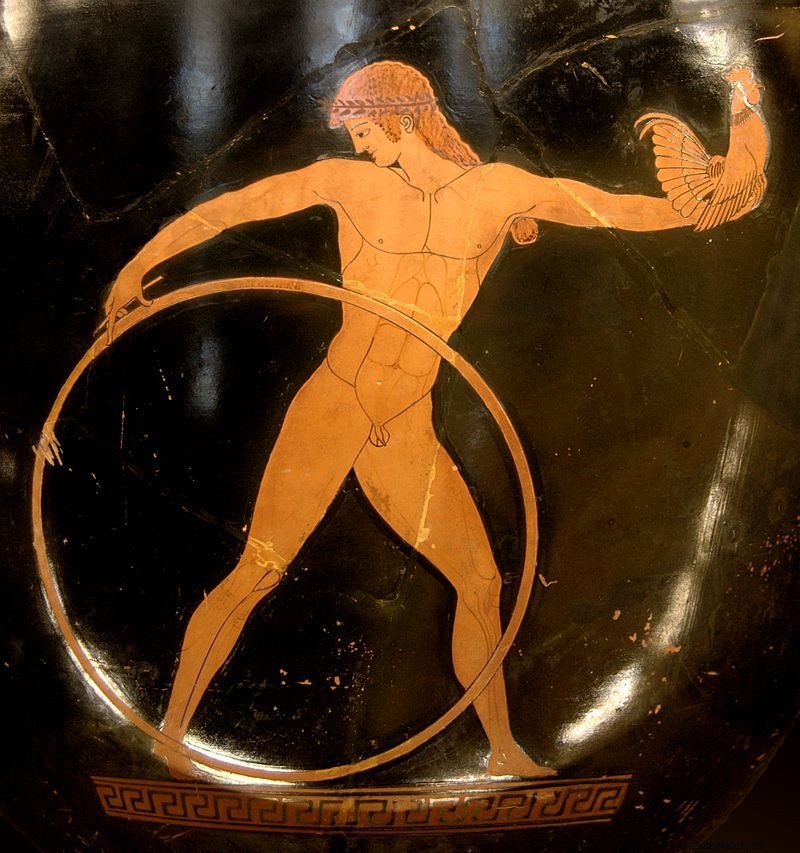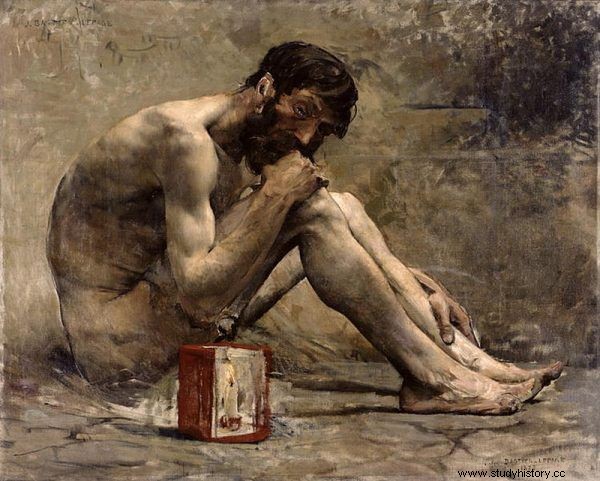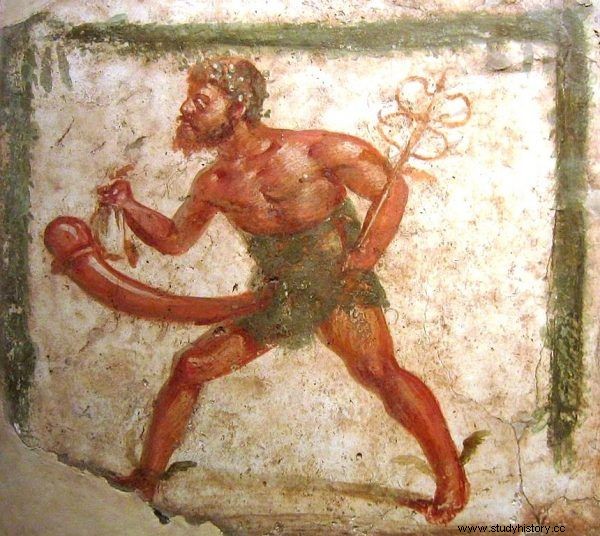A well-behaved Greek should start a sexual life only after he has reached the age of majority. A virtuous Roman woman - at the time of marriage or just before. But can you guess how old the ancients were then, and how did they live their first time? These stories will shock you ...
The Greek bridegroom was much older than his chosen one, but of course he did not live chastely until the marriage. Not at all. Nobody required this of him. It's hard to imagine him being a virgin at the time of the wedding.
Before that, he had to deal with two phenomena common in the ancient Greco-Roman world:prostitution and pederasty (they also accompanied him later in life). So he could experience his first time with a prostitute or in the arms of an older lover. There was also a slave girl or - as in anecdotal stories - an elderly neighbor, most often:a foreigner without any resistance.
What goes and what doesn't
Contemporary medics and philosophers stated, however, that sexual life should not start too early, because it exhausts the vitality of young people, stopping the growth of the body and the development of the spirit. They even compared attitudes to "minor epilepsy", orgasmos meant swelling and extasis - getting out of myself.
That is why the philosopher Socrates, who lived in the 5th-4th centuries BCE, recommended moderation above all. Dating from the 2nd century CE a Roman physician of Greek descent, Galen, stated that many young men became seriously ill because they had learned the pleasures of the body too quickly. And they should not do it sooner than after reaching maturity, i.e. after the age of fourteen .

There were many temptations for the Greeks before they got married. Not only female prostitutes, but also older men who, in accordance with the idea of pederastic love, introduced young people to the world of sex. The picture shows a painting on a Greek vase, depicting Ganymede, the mythological lover of Zeus.
Athenaeus from Naukratis, at the turn of the 2nd and 3rd century CE, postulated that boys, even at this age, should engage in exercise rather than sex. He wrote:
(...) Since sperm production begins at this age and violent desires drive young men into sexual intercourse, there should be so much physical exercise that exhausting the body and spirit , helped in the bud to suppress youthful desires .
In the ancient world, however, the issues to which modern moralists devote a lot of attention have been almost completely ignored. It's about masturbation among teenagers. This practice was considered by the Greeks to be an invention of lascivious satyrs (who then shared their "discovery" with people), however, it did not have a particularly negative connotation at that time. Of course, the waste of semen was disapproved of, and Aristotle threatened that adolescent masturbating girls would be even more promiscuous in the future. Nevertheless, many philosophers treated masturbation as an almost hygienic cleansing of tension and discomfort from the body .

Diogenes (in the painting by Jules Bastien-Lepage, 1873) was a Greek philosopher who became one of the most popular figures of antiquity. He demanded not only the abolition of marriage, but also preached the so-called shamelessly that "what everyone does can be done in public."
“According to the Stoics, masturbation - like marital sexual intercourse - was to be practiced in harmony with nature; sex with oneself fit into this framework more easily than sex with another person, explains the American historian and sexologist Thomas Walter Laqueur. Woody Allen's words about masturbation are having sex with someone you really love!
Of course, if you were an adult, respected citizen, it was not fitting to masturbate in the market, as did the philosopher Diogenes . On the other hand, which of the ancients would have become addicted to masturbation when there were so many carnal opportunities around? Well, unless the philosophers' appeals for restraint were taken seriously. After all, in the 4th century BCE Plato imagined that in a perfect world - which we should strive for - marriage in harmony with nature would bear children and that would be enough for them, and that prostitution, masturbation or - even so valued in ancient Hellas - pederasty would not be needed ...
Shocking victim
In Rome, on the other hand, sexual initiation most often took place during the wedding night. At least theoretically. Especially since the Romans married even ten-year-old girls (this was the case, for example, during the empire), so it was difficult to have premarital affairs.
The age of the young couple, however, is nothing compared to what the "first time" of Roman women could have looked like in practice. In the early days of the Roman state, it was said that it happened that the defloration of the bride was undertaken not by the young but by his friends! Was the groom giving them priority? He was so welcoming, or maybe he was afraid of something? It is not known, however, whether this practice was a reality or is only a legend today.
No less shocking - and not much more confirmed - seems to be the ceremony accompanying the marriage in honor of the deity called Mutunus Tutunus, and represented in the form of a member. He was kept in bedrooms. Brides used to sit on this phallic image, thus offering the deity their virginity . The following questions immediately arise:Was it purely symbolic? Perhaps it was related to some ancient fear of defloration of men, as well as the habit of helping the groom by his colleagues? Could depriving a woman of her virginity threaten to anger some supernatural forces?

The Roman deity associated with fertility was Mutunus Tutunus (probable image in the illustration - a fragment of a Pompeian fresco). Historians suspect that his sanctuary was located on Welia Hill, along with a statue of the god-phallus. It is said that brides used to sit on his image on their wedding day to offer him their virginity ...
There is no certainty, because little information about Mutunus Tutunus has survived, and during the fall of the republic and the birth of the empire, this bizarre custom is already history. There is no such macabre content in wedding songs by, for example, Catullus (1st century BC). Even though they are sometimes dreaded, faith in the future happiness of young people reigns here:
Not reckless your spouse,
No evil concubine,
To indulge in fornication
I won't want to share a bed with another,
Not with this lovely breast.
(...)
Look:on the Tyrian bed
Your spouse has already gone to bed
And all of you is thirsty.
(...)
in the depths of the chest the fire burns no less than yours.
But it burns even deeper .
And whatever happened in the Roman marriage bedroom on their wedding night, it was certainly not carefree, uninhibited sex. It was said that the wife's shame should not fall with the robe thrown off, and darkness could not permit all possible frolics.
***
The text was created during the author's work on his latest book. " Ages of shame. Sex and erotica in antiquity ” .
